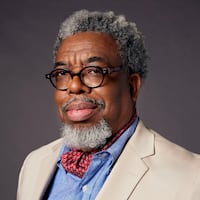The Atlanta Journal-Constitution has been covering the Falcons stadium since its proposal. To read the latest on the proposal and in-depth coverage, visit, www.ajc.com/s/new-falcons-stadium/
The first thing that strikes you during a service at Friendship Baptist Church is the music.
Last Sunday, during a tight service that featured speeches by Atlanta Mayor Kasim Reed and Bahamas Prime Minister Perry G. Christie, there were at least 15 musical selections – each more beautiful than the last.
With each song, Melvin Webb, 73, smiled and rejoiced.
His wife, Brenda Webb, 68, in a blinding white suit, was ushering. She made sure everyone was in their place.
“When we first started coming here, it was friendly, open and welcoming,” Melvin Webb said. “And the music was outstanding. It still is.”
While the music beckoned the heavens inside, outside, storm clouds were gathering over the 151-year-old congregation, both literally and figuratively.
Already overshadowed by the Georgia Dome, the church is at risk of being swept off its site by a new, even bigger, billion-dollar stadium. Church leaders are negotiating with Reed over the city's proposal to buy the property to make way for the new home of the Atlanta Falcons.
The new stadium is scheduled to open – deal or no deal – in 2017.
Not one word of a proposed move was mentioned during the service, which celebrated the Bahamas’ 40th anniversary of independence.
“We haven’t had any sermons about it during Sunday services,” said Lloyd Hawk, the chairman of the church’s board of trustees. “We have been a church for 151 years. And regardless of what happens, we will remain a church. So for us, Sunday is business as usual.”
Last month, the city offered the church $15.5 million for the property at the intersection of Martin Luther King Jr. and Northside drives. Earlier, the city had offered $13.5 million; the church countered with $24.5 million.
Hawk would not comment on any figures, except to say that no agreement has been reached and negotiations are continuing. Meanwhile, the issue is very much on the minds of the members, including the Webbs.
“I have mixed emotions, because I have been attached to this church for so long,” Brenda Webb said. “But biblically speaking, the people make up the church. Not the building.”
“My concern would be living in the shadow of this huge structure and what would be the impact if we decided to stay,” Melvin Webb said. “And I want to make sure that if we have to move, it would not require us to use any of our money.”
Hawk did say church leaders have had a lot of conversations with members about the possibility of relocating. At least two church-wide meetings have been held.
Maybe it was a little more than ironic that at least one of the songs sung Sunday was “Guide My Feet.”
“Guide my feet while I run this race/For I don’t want to run this race in vain!”
With an Aug. 1 deadline approaching, the church’s leadership must make a decision soon and present it to the 400-member congregation for a vote.
“In our church,” said Melvin Webb, a biology professor at Clark Atlanta University, “the majority rules.”
If the church does not move, the city has said it will build the stadium anyway, re-routing Martin Luther King Jr. Drive around the sanctuary. The fate of a second church, Mount Vernon Baptist Church, is also in play.
“To disrupt two black churches for a stadium to play ball doesn’t make sense,” said Juanita Abernathy, who has been a member of Friendship for about 15 years. Her husband, the late Rev. Ralph David Abernathy, is the former pastor of West Hunter Street Baptist Church. “Friendship Baptist Church has been in that spot for 151 years. It is a landmark and when you have a landmark, you keep it.”
The church’s first permanent structure was located down the street at Haynes and Markham streets. It has been at its current location for 133 years. Hawk said while the church is listed among historic places on the National Registry, it does not have a historical landmark designation.
Most Sundays for more than 20 years, the Webbs have driven from their Decatur home to 437 Mitchell St. in Downtown Atlanta to attend services.
They were attracted by the fact that several of their friends and relatives were already attending. They were also drawn by the church’s history, which dates back to its 1862 establishment in an old boxcar and includes a key role in the early development of Spelman College, Morehouse College and Atlanta University.
It took Melvin Webb a little longer to join than his wife, but he now teaches Sunday school, is a member of the deacons board, president of the Adult Fellowship Ministry and on an occasional Sunday — when the Falcons are in town — works in the parking ministry.
Brenda Webb serves as an usher, a member of the clothing ministry and a singer in the retirees choir, which sings every fifth Sunday.
Melvin Webb said if the church moved he hoped it would at least remain in the neighborhood where it could do some good. Brenda Webb wants it to stay family-oriented and fears the temptation of a move creating a mega church.
Some members fear that the church might not survive a move. That fear is rooted in the early 1990s, when several businesses and churches displaced by the Georgia Dome simply disappeared.
But that spectre doesn’t trouble Melvin Webb. “The possibility of that happening is less than zero,” he said. “Friendship will exist, no matter what happens.”
About the Author
The Latest
Featured


